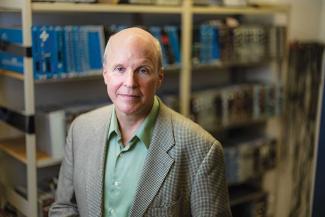The grant is to build a new apparatus aimed at solving “one of the most important problems in physics today” — precisely measuring the lifetime of a free neutron.
The neutron, a fundamental particle present in the core nucleus of all atoms — except hydrogen — is an important ingredient of ordinary matter. Neutrons contribute the “glue” that holds the atomic nucleus together. Most of the mass of the Earth is provided by neutrons. But when freed from the confines of a stable atom, the neutron is unstable. It decays with a lifetime of about 15 minutes into a proton, electron, and antineutrino, a light, electrically neutral particle.
“This free neutron decay was a key process in the early universe,” Wietfeldt said. “It governed the formation of the lightest elements in the first 5 minutes after the Big Bang. In particular, the neutron decay rate determined the amounts of helium and hydrogen in the early clouds of gas that later developed into stars and galaxies.”
The neutron lifetime has been measured by dozens of experiments over the past 70 years, but the most precise results from the two leading methods — cold neutron beam measurements and ultracold neutron storage measurements — significantly disagree by more than 4 standard deviations.
Correcting that discrepancy is the goal of the experiment, which will use a new apparatus called BL3. “We will measure the free neutron lifetime using the cold beam method to unprecedented precision and innovative techniques that promise to resolve the neutron lifetime discrepancy,” Wietfeldt said.































































